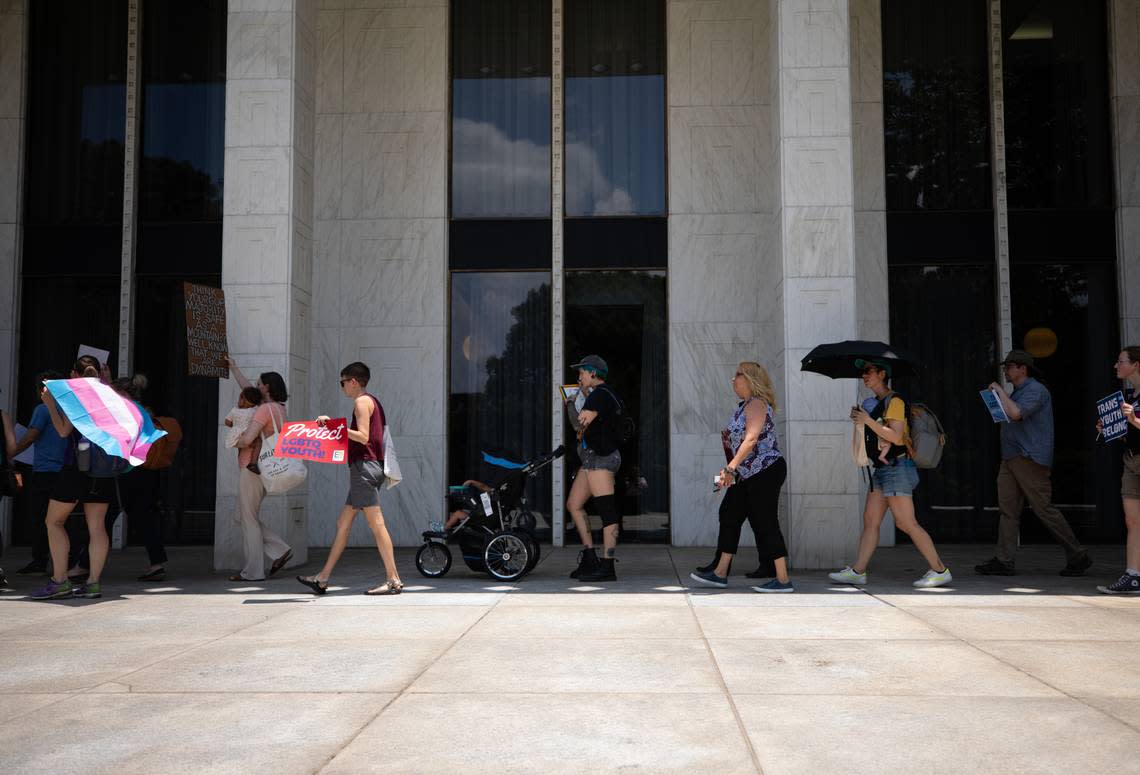Restrictive transgender legislation surged in NC this year. But why now?

North Carolina isn’t the only place seeing a surge of legislation placing various restrictions on transgender people.
This year, 560 “anti-trans” bills were introduced in 49 states, according to Trans Legislation Tracker. In 2022, that number was less than a third of that — at around 174 bills, per the tracker.
Republican state lawmakers have pushed a variety of bills targeted at transgender people, such as transgender athlete bans, limits on gender-affirming care for minors or barring discussions of gender identity in schools.
In North Carolina, bills aimed at implementing those ideas have gained considerable traction among the GOP supermajority in the legislature, which is poised to pass all of them into law over Democratic Gov. Roy Cooper’s objections. Cooper vetoed all three bills Wednesday.
Many factors propelled the country into the current climate in which state legislatures have proposed a record-breaking number of bills targeting transgender people, said Katherine Franke, the Columbia University Center for Gender and Sexuality Law director. Some of that has to do with the increasing visibility of transgender people.
Franke, who is a lesbian, started her career in law during the 1980s working on HIV discrimination, which she said was harming her community. Around that time, transgender rights were not considered as frequently, and it was very common for transgender women to not be welcomed in lesbian spaces, the law professor said.
In time, the larger LGBTQ+ movement became more accepting of transgender members, and their political and social visibility increased. But with that larger acceptance came more bigotry and violence aimed at the transgender community, she said.
Bathrooms and backlash
That “vitriol toward trans and gender non-conforming people” seemed to intensify following the landmark U.S. Supreme Court case Obergefell v. Hodges, which federally legalized same-sex marriage. As the country reached a national consensus on lesbian and gay rights, she said, Republicans had to shift their strategy.
“When the appeals to same-sex marriage started to run out, around 2015-2016, that no longer was mobilizing a base,” Franke said. “The turn to bathroom bills and things like that, we started to see a lot more of in state legislatures.”
But that sparked a backlash in North Carolina, where 2016’s House Bill 2 banned transgender people from using bathrooms in schools and other government buildings that matched the gender with which they identify. The NCAA and others canceled events in the state, leading to the bill’s rollback a year later.
Steven Greene, an N.C. State political science professor, had one name in mind to describe why there’s been a rise in “culture war politics” including transgender-related bills: Donald Trump.
“He has caused a shift in American politics,” Greene said. “He’s found there’s a real untapped market, just the amount of energy in these culture war politics.”
Franke said Trump pushed the boundaries of what would be OK for an elected official to say. He appealed to people’s more “bigoted and fearful instincts,” she said.
The Republican Party is very heavily focused on “culture war politics,” Greene said, which include other issues like critical race theory and diversity, equity and inclusion. It also encompasses a broader focus on LGBTQ+ topics, with a particular focus on transgender people.
Now, Greene isn’t so confident that a bill like HB2 would backfire on Republicans in today’s political climate. If anything, that bill made them exercise caution on certain topics, he said.
“Republican legislative leaders in North Carolina are more savvy and strategic politicians than it seems in a lot of other states,” Greene said. “They really recognize trying to not push things too far.”
Shift to laws with more political advantage
Transgender issues can also provide an opportunity to divide Democrats but unify Republicans, Greene said. For example, Greene brought up the case of transgender athletes, noting that some Democrats may empathize with a ban as a way to make sure cisgender women are treated fairly in sports.
Polls released in the past year depict a nuanced perspective from Americans on transgender issues, with some legislation garnering more opposition than others.
A 2022 series of polls from the Pew Research Center on gender identity and transgender issues showed 64% of respondents favored protecting transgender people from discrimination. Almost 60% of Democratic participants said that society hasn’t gone far enough to accept transgender people.
The Pew Research Center poll also revealed some disparities among Democrats on what type of transgender-related legislation they would favor: 37% of Democratic respondents reported favoring restrictions for transgender athletes’ participation on the team they identify with, while 26% were in favor of outlawing gender transition procedures for minors.
A June Gallup poll illustrated similar findings on transgender participation in sports, as nearly 70% of respondents said that athletes should only play on teams that match their sex assigned at birth. That statistic rose from 62% support in 2021.
For barring gender transition procedures on minors, the NPR/PBS NewsHour/Marist National Poll showed just over half of the participants opposing any legislation that would criminalize gender-affirming care for minors — with 68% of Democrats disapproving.
“They’re going after the areas where it’s, to me, clearly more politically advantageous and less likely to result in substantial backlash,” Greene said.
Animosity toward transgender people won’t change unless the culture shifts, Franke said. A similar evolution happened with lesbian and gay people, where they were “transformed from being predators and perverts to just regular folks.” The country’s altered perspective took hold partly through entertainment and mass media normalizing gay people, she said.
“That has not happened yet for trans people. They remain ‘monsters.’ Not fully human, something to be afraid of,” Franke said.
